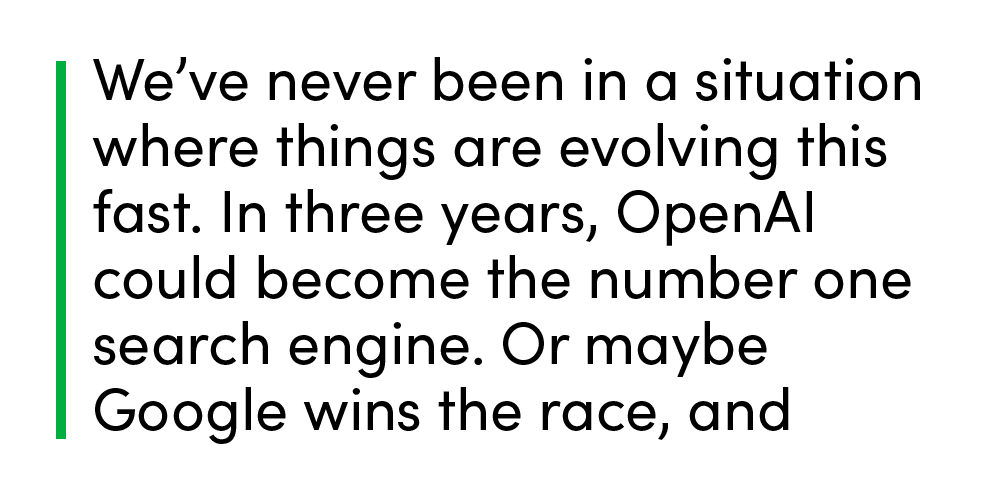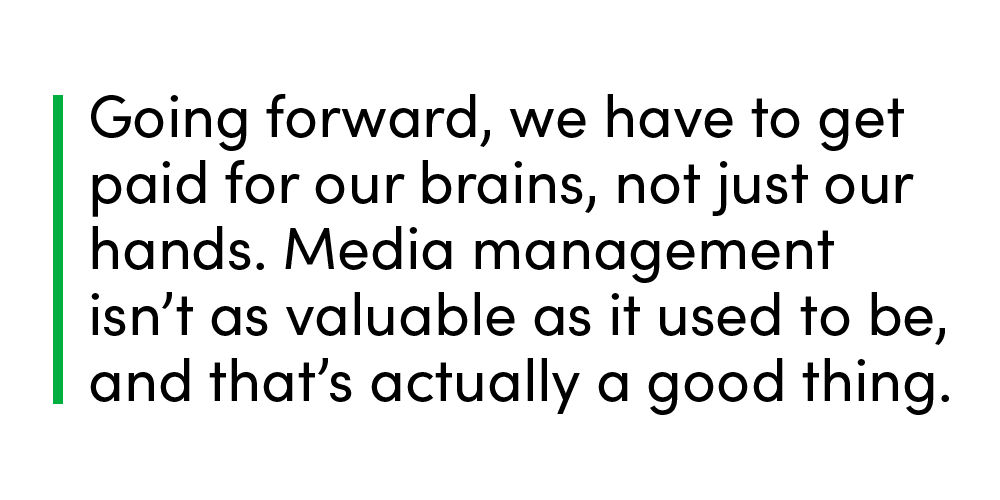Leadership Lens is a series in which we feature Leap Group leaders discussing industry trends, shifting landscapes, and other topics crucial to brand relevance.
In the past few years, the search landscape has evolved at an unprecedented pace. Google’s shift from Universal Analytics to GA4 has disrupted traditional reporting, while the rise of AI-driven tools is challenging long-held search strategies. At the same time, search behavior itself is evolving—users are asking questions using more conversational and natural language, relying on AI assistants, and engaging with visual and audio search in new ways. The result? Marketers must rethink how they measure success and prove ROI in an increasingly AI-first world.
In this installment of Leadership Lens, we sit down with Ryan Smith, President of Leap (amp); Jordan Turner, Senior Director of Media; and Rebecca McBride, Integrated Marketing Manager, to explore how these shifts are reshaping both paid and organic search. Together, the three leaders unpack the impact of the 2021 marketing boom, Google’s evolving product support, and the sudden disappearance of once-reliable data points. From the rise of AI-powered tools to the pressure on brands to unify their paid and organic strategies, we’ll discover what it will take for brands to thrive in the next era of search.
How has the search landscape changed in the past few years?
Jordan: 2021 was an unprecedented time for marketing. We had been locked down for more than a year, and suddenly everyone had become an e-commerce expert. We still had Universal Analytics at its peak, we still had the conversion types we were used to, and marketing, as a whole, felt like it was figured out.
But since then, the influx of data and new advertisers has exposed larger gaps in Google’s operations and expense flows, which have affected both paid and organic search. The surge in accounts in 2021 led to Google decoupling its products from long-standing support systems like Universal Analytics, shifting instead to GA4. As Google identified gaps in the data, they simply deprecated certain data points and removed them. On the organic side, Google’s updates have often seemed more focused on controlling its free search ecosystem rather than improving content relevance.
2021 taught people with little prior knowledge how to analyze data, but now that data is gone. Advertisers are leaning harder on agencies for insights, but Google is providing agencies with fewer answers. This shift has allowed companies like OpenAI to thrive. Now everyone is re-evaluating things like what demand generation means for SEO.
What about the transition to GA4?
Ryan: The transition to GA4 and the preparation for it fundamentally shifted the landscape. While GA4 itself is free, the data we get isn’t as useful as what we had five or six years ago. The analytics world has evolved. Social and search used to be measured in similar ways—we could talk about CPMs, traffic, engagement, and reach, and clients would know that as long as those numbers were going up, we were on the right track.

But marketing has since shifted from general brand awareness to performance-driven efforts. What used to be high-level awareness tactics are now expected to deliver measurable ROI. During COVID, it was all about volume—driving traffic, capturing demand, and less about tying every dollar to a direct sale. There was more money in the system, so proving ROI wasn’t as much of a concern. Now, marketers are constantly being asked to prove that every dollar spent returns two, three, or ideally seven or eight dollars. That pressure is across all channels, but especially in search, where paid efforts must have a direct, measurable impact.
And the impact of companies like OpenAI?
Ryan: Going forward, OpenAI is going to have a massive impact. For the first time, Google is facing real competition. The way people search is shifting. Instead of asking, “Where’s a good Chinese restaurant near me?” people will ask, “What Chinese place should I go to tonight?” AI will know your preferences, your past choices, and suggest the best option. It may even ask, “Would you like me to place an order or book a reservation?” Search is where we’ll see the biggest changes, because new platforms will emerge, and how we interact with them will shift dramatically.
The companies preparing for this shift—both in paid and organic—will win. Soon, a significant portion of website traffic will come from AI crawling sites and delivering responses directly to users. If brands don’t adapt—by structuring content for AI, optimizing social media, and integrating AI-driven tools—they’ll lose visibility. The AI-driven future isn’t here yet, but in our industry, we have to be ready for it now.
What are the limitations of other agencies’ search programs?
Jordan: You used to be able to say, “I’m the e-commerce guy, the lead-gen guy, the DTC guy,” and hang your hat on that expertise. That doesn’t work anymore. If you can’t apply what you know across different models, you’re done. I don’t even think you can say, “I’m a channel guy” anymore. You need to have an answer across the board. And you can’t just call yourself a media manager anymore—you have to be a data analyst at all times.
Ryan: Yes, we’re all analysts now. Going forward, we have to get paid for our brains, not just our hands. Media management isn’t as valuable as it used to be, and that’s actually a good thing. Meta has built an easy interface for managing media every day. Google, on the other hand, builds its own tools, keeps things separate, and makes them complicated. And now, they’re trying to bridge that gap with products like PMax, Lead Gen, and Demand Gen—essentially making Google Ads function more like Meta.

The future is that media buying and optimization will become so easy that our conversations with clients won’t be about what changes we made this week. Advertising has never been about tweaking individual settings—it’s about understanding how humans interact with brands. We’ve been stuck focusing on, “Which keywords should we adjust this week?” when we should have been asking “Is this even the right strategy for your brand?”
But that’s going to change, because we’re shifting away from keywords toward natural language models. People will find your brand by communicating in normal language—no more decoding marketing and media silos like “organic” versus “paid.” It’s all about making sure your value proposition is in front of the right audience and easy to find. That will simplify things and lead to more sophisticated, high-level conversations.
How is Leap’s approach to search different?
Jordan: We had a head start because Ryan never made me wear a “lead-gen hat” or a “DTC hat.” He just said, “Do search for us.” So we worked across multiple clients, verticals, and business models. We rebuilt search in the image of that day. And yes, there’s always work to modernize it. But if you try to search for a lot of what Ryan and I have talked about today, you won’t find answers—because we’re evolving it on the fly.
Ryan: Right. We’re not locked into a single model of how we do things. And it’s so important that we don’t limit ourselves to a rigid approach. Because if you only focus on one way of doing things—especially in search—you can become outdated overnight.
What makes us different is that we consider what our clients are trying to achieve and make recommendations based on that. Sometimes, we may not have the exact resource or technology in-house, but we start by analyzing what business problems they’ve faced, what performance issues they’ve encountered, what their competitors are doing, and how their unique audience wants to engage.
From there, we determine the best approach—whether it’s search, social, or another strategy. Yes, execution is critical, but what sets us apart as a small to mid-sized agency is our strategy-first mindset. Our clients pay us for our thinking, not just for the manual execution of tasks. With that kind of relationship, we build better, lasting partnerships with clients who truly align with us—rather than just those looking for someone to “do my search ads” or “handle my SEO.” That kind of engagement is never a great fit for us.
Are there any other trends you see for search in the coming months?
Rebecca: One of the big trends for 2025 is making search more visual. We understand how important YouTube SEO is—it comes down to scripting, calls to action, descriptions, and key bullet points. I’m not seeing a lot of that from our current clients yet, but it’s something we can absolutely help with. Instagram is another example—it also impacts Google SEO. We’re seeing a surge in visual and even auditory searches, and that’s going to be a major focus for improving SEO this year.
Ryan: We’ve never been in a situation where things are evolving this fast. In three years, OpenAI could become the number one search engine. Or maybe Google wins the race, and nothing changes. The key is staying ahead of it and learning how to use these tools. And for us, the priority is figuring out how to leverage them for our clients. Ad tech is expensive. The mid-size and challenger brands we work with can’t win by simply outspending their competitors. They have to be smarter. That’s where we come in.
“While GA4 itself is free, the data we get isn’t as useful as what we had five or six years ago. The analytics world has evolved. “
Take what we’re doing with Summit Brands. Our strategy is focused on making consumers’ lives easier by solving a problem they don’t think about every day—until they open their dishwasher and it smells awful. Our approach is to reach people at that moment with a simple solution, not trying to force something irrelevant on them.
Marketers need to focus less on being disruptive and more on being useful. You don’t need a 60-second unskippable YouTube ad that people hate. Why not serve the ad in a way that respects the user’s experience? If you’re advertising on TV, choose platforms where people expect ads—where they’ve opted into a lower-cost, ad-supported experience. The goal should be making advertising less intrusive and more valuable.
What are the advantages Leap offers versus a more traditional media agency or a media department within a traditional ad agency?
Rebecca: In a traditional agency, you’re often limited to just a few experts in specific fields. Here, we have a broad group of subject matter experts who can support every aspect of a project, from creative to copy to web development. And we all work toward the same vision.
At traditional agencies, that level of integrated support isn’t always there. Here, we bring all the pieces together. For example, I recently suggested an AR concept for a client that would allow users to interact with the product. At other agencies, that idea would have been dismissed outright— “Nope, we don’t do that.” But at Leap, we have the designers who can build the assets and make it happen. Here, the response is, “Let’s do it.” And that kind of enthusiasm and adaptability sets us apart.